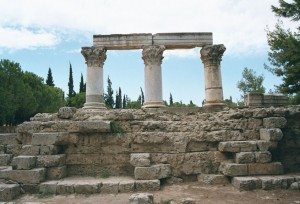If for this life only we have hoped in Christ, we are of all people most to be pitied. [1 Corinthians 15:19, NRSV]
[L] Corinth with Akrocorinth, by Carl Anton Joseph Rottmann. [M] Temple of Octavia, Ancient Corinth. [R] Statue of St Paul at St Peter’s Square.
Arguably the most pastoral of all the books in the New Testament canon, St Paul’s First Letter to the Corinthians directly addresses ten pastoral problems in that ancient city. Paul had spent some eighteen months planting the first church there, before moving on to Ephesus. After his departure from Corinth, the young Christian community there was dogged by controversies and these pastoral problems were brought to his attention in Ephesus both orally as well as in writing.
The tenth problem, the last of the series addressed by Paul in the epistle, had to do with the resurrection of the dead. Rhetoricians know that the first and the last of a series are usually the locations for strategic placement of the most important points. And here, Paul is spot on, telling his readers that it has to do with the gospel itself – Jesus the Christ crucified and resurrected. If all the Christians had to share was Jesus’ suffering and him hanging on a tree, Christianity would have nothing more to offer than the many stories of freedom fighters martyred for their cause. Christianity did not work for him, Paul insisted, without eternity. That was the point Paul wanted to drive home before he rounded up his epistle.
In context, Paul’s arguments were located in what is commonly known as the Resurrection Chapter, since it primarily addressed the reality of the resurrection of Jesus and those who believed in him. Paul made a compelling case that apart from the resurrection, apart from us having an eternal outlook, our so-called Christian faith, whatever else it might offer, would be quite pointless.
At issue between Paul and the Corinthians was not only the Corinthian understanding on resurrection, but how that understanding affected their behavior. There was an undesirable lifestyle that Paul wished to correct, caused either by a breakdown in proper belief or in properly matching behavior with belief. The stronger element seemed to be the first, that is, under the influence of a contrary teaching on a life in God after death, some amongst the Corinthians’ early converts had lost hope in the “future” life. As a result of that erroneous thinking, they felt that the only thing left to do was to abandon themselves to snatching as much happiness as they could find in this present life. In so doing, they returned to the same kind of life without God that they had before Paul evangelized them. They returned to the wisdom of this age: “Let us eat and drink today, for tomorrow we die” (1 Cor 15:32), which were the very words uttered by Jerusalem in a moment when it forgot about God (Isaiah 22:13), distrusting his promise to Israel of continued life in the face of a powerful enemy.
Compared to the so-called “freedom” prevalent in the Corinthian society, Paul would insist that the Christian life was one of self-denial and sacrifice. That would often involve them denying the things that appealed to the natural and unspiritual part of their being. They certainly challenged them to turn down the offers of unrestricted fun and joy in a loose but pleasure-seeking lifestyle. Praying, fasting, giving and much else, were all components of Christianity that went against the grain of the flesh that the Corinthian society freely indulged in. And on top of all that, Christians in Corinth bore the added misfortune of persecution for being followers of Jesus Christ, if not politically, certainly in a lifestyle considered silly and weird by the larger community. As Paul would go on to affirm elsewhere: “Indeed, all who want to live a godly life in Christ Jesus will be persecuted” [2 Timothy 3:12, NRSV].
In our conversations with Catholic lay persons who have the desire to offer services to the faith community, we have learned that their legitimate lamentations over their misfortune, more often than not, arise from two fronts: first, from the hierarchs and the clerical personnel and next, from the rest of the community. But what are they lamenting about, usually? Your list may vary from ours, but some items we believe are common, and they include:
- Lack of encouragement, affirmation or recognition;
- Outright blockades;
- Refusal of financial assistance;
- Wanton neglect on welfare;
- Non-collaboration.
If this life is all there is, who in their right minds would want to sign up for this kind of Christian service? But, as Paul went on to argue in the rest of his epistle, this life is not all there is. Eternity awaits all who remain faithful in their stations. The benefits that await the true and steadfast believers in Christ are limitlessly unparalleled. Theirs in due course would be a life face to face with eternal glory and power. The light of eternal glory in the resurrection belonged to the lot of faithful Christians who held fast to a life of commitment and discipline, and a value system centred on the Kingdom of God upon which God affirmed his very own Son by raising him from the dead. Our focus shouldn’t be on the benefits of this life alone. Jesus never intended us to fulfill the call to follow him apart from the promises that pertain to the next life.
Copyright © Dr. Jeffrey & Angie Goh, June 2013. All rights reserved.
You are most welcome to respond to this post. Email your comments to us at jeffangiegoh@gmail.com. You can also be dialogue partners in this Ephphatha Coffee-Corner Ministry by sending us questions for discussion.



